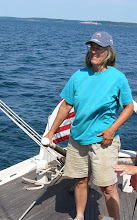

I'm offering an introduction to Beach College on May 5 6:30 pm at the Brown Road branch campus Wolcott. As I wrote last month on the LOLOL (Lake Ontario Log On Line at www.silverwaters.com) strong connections between nature and families are vital to everyone's well being and beach college is a fun way to enjoy and strengthen some of those connections.
I've headed to the edge ever since I could toddle. My first salt water experience was a visit to a sandy beach somewhere near Boston where family relatives resided. I slogged through what seemed like miles of deep sand so different from my native narrow pebble beaches. I saw and chased gulls the size of eagles (when I was five years old.) And I waded into icy seawater up to my ankles and quickly retreated. Then I told my mother I liked my little beach back home with its summer warm lake much better. A year or two later a trip to a finger lakes cottage introduced me to fossil hunting on a narrow bit of rocky shore. I still recall the thrill of discovery, the greedy gathering, the delight I took in my horde of fossil brachiopid shells and small horn corals which I thought were fossil teeth from a giant carnivore. Several jars of them kicked around my house for years.
In college and beyond when I started cruising with various sailboats, I advanced my littoral studies after landing on many more beaches. I explored sandy beaches on the Chesapeake where I once stranded my Lighting on a falling tide. I peered into tide pools on Maine's coast and pried mussels off the rocks of Cape Ann to steam for an impromptu clam bake in a biology lab. One August night during a red tide I discovered a low tide mudflat that illuminated with a flash of cold fire under each footstep. And as millions of tourists have done through the ages, I walked the glorious white sands of tropical beaches.
Beside the water, alone or with family and friends, endless varied treasures and memories await the beach college student. Perhaps you'll find a message in a bottle or some useful item of salvage. Perhaps a fossil worm borrow, sea lily stem fragment, bryozoans, cephalopods, or a brachipod shell fragment will turn up.
Science tells us the more awareness an organism has of its environment, the better its chances of survival are. Our environment consists of more than computer games, shopping malls, highways, and fast food restaurants. It includes air, water, and beaches. For your own good and that of the planet, take a course at Beach College this summer.

No comments:
Post a Comment